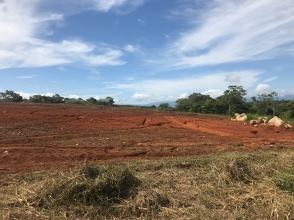GH senior Stephanie LeGault spent her summer working with an NGO in Costa Rica with CISG
- Global Health Program

- Mar 9, 2020
- 2 min read

Stephanie spent 2 1/2 weeks this summer in San Vito de Brus, Costa Rica with the Interamerican Center for Global Health (CISG)! She worked with a non-governmental organization called Casas De La Alegria (Houses of Joy), a day-care center for children aged 0-12 of local migrant coffee-pickers.
Stephanie worked directly with the Indigenous community Ngabe-Bugle, and with non-indigenous healthcare providers, to create and implement solutions to bridge health education gaps among caregivers and children. The focus was to provide early cognitive

interactions for infants through memorization games promoting hygiene and personal sanitation. Methods included alternative items that could be used when they return home. Stephanie presented her practicum proposal to the head of the organization, who will now be presenting it to the UNICEF board for funding to actualize the educational material that Stephanie created!
Stephanie hopes to one day become an International Occupational Health and Safety inspector for exploited workers, and this program allowed her to explore her passions as well as learn more for her senior thesis.
“This program was focused on children and health education but I was able to visit the coffee fields and learn the process of coffee-picking, the working conditions, the community who migrates to work and how long they work away from home for. I visited the social security migration office where Panamanian coffee-pickers will start receiving healthcare during the harvest effective Sept. 2018; I will apply this to my senior thesis.”
While most of Stephanie’s time was spent on work or education-related activities, during free time after field visits, students in the program would explore the local area and stop in restaurants or cute ice cream shops for a treat. As with any new experience, there

were some challenges at first. Stephanie relates that the greatest challenge during the program was becoming accustomed to the hostel location. The house was mostly outdoors so insects had no boundaries, but she was able to accept it after a few encounters with them. Stephanie was also the only student in the program working towards a bachelor’s degree. All other students were either in Master’s programs in the U.S., or were Costa Rican students doing an internship before starting their MD residency program.
“I learned something new every moment I was there and met so many wonderful people. The scenery was breathtaking!”

CISG Practicum Programs are designed to develop experiential and contextual skills of collaborative interdisciplinary work in real-life situations related to the field of global health. CISG uses applied and interdisciplinary techniques such as a holistic educational approach that brings together the social, political, economic, legal, cultural, and environmental realities of the world we live in. The program advocates for hands-on learning and encourage broad knowledge of all topics while providing specific focus on your project. Students work alongside CISG local partners and local populations as part of their practicum in Costa Rica.




Comments